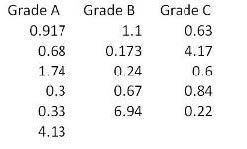CSSBB Online Practice Questions and Answers
Which of these is not a primary cause for Non-normal Data?
A. Skewness
B. Mixed Distributions
C. Kurtosis
D. Formulosis
E. Granularity
A Full Factorial experiment using a 2 level 4 factor approach has been proposed to test the viability of an extrusion machine experiment. How many treatment combinations will this approach involve?
A. 8
B. 16
C. 32
D. 64
If in an experiment all possible variable pairs sum to zero the design is Orthogonal.
A. True
B. False
The primary objective in removal of waste is to improve the Order Production Cycle where the time from _________________ to the time of receipt of payment is compressed.
A. Shift start
B. Product development
C. Receipt of an order
D. New fiscal year
Of the various types of data shown below which is NOT representative of Variable Data.
A. Length of a table
B. Liters of solution added to a formula
C. Number of employees wearing a uniform
D. Miles per hour of a vehicle
To be an effective Lean Six Sigma practitioner one must understand the difference between ___________________________.
A. ANOVA and the Analysis of Variance
B. Nonparametric tests and tests of Non-normal Data
C. Practical and Statistical significance
D. F-test and test of variances of 2 samples
For the data set shown here which of these statements is/are true?

A. Hypothesis Testing of Means or Medians cannot be done since there are an unequal number of observations for the 3 samples
B. A Paired T-test would be applicable for comparing Grade B and Grade A since they follow each other in the data set
C. Grade A has the lowest sample Mean of the 3 samples
D. Grade A has a higher sample Mean than Grade B
When a Belt creates a Process Map she will use a __________________ to depict a decision point requiring a Yes or No decision.
A. Circle
B. Square
C. Diamond
D. Rectangle
When we compare short-term and long-term Capability which of these is true?
A. Cp is better for the short term
B. Both short-term and long-term performance are alike
C. Performance tends to improve over time
D. Cp is better for the long-term
Range Charts are the technique used to determine if ______________ are occurring within the subgroups of the SPC Charts.
A. Common Causes
B. Special inspections
C. Unnatural forces
D. Special Causes